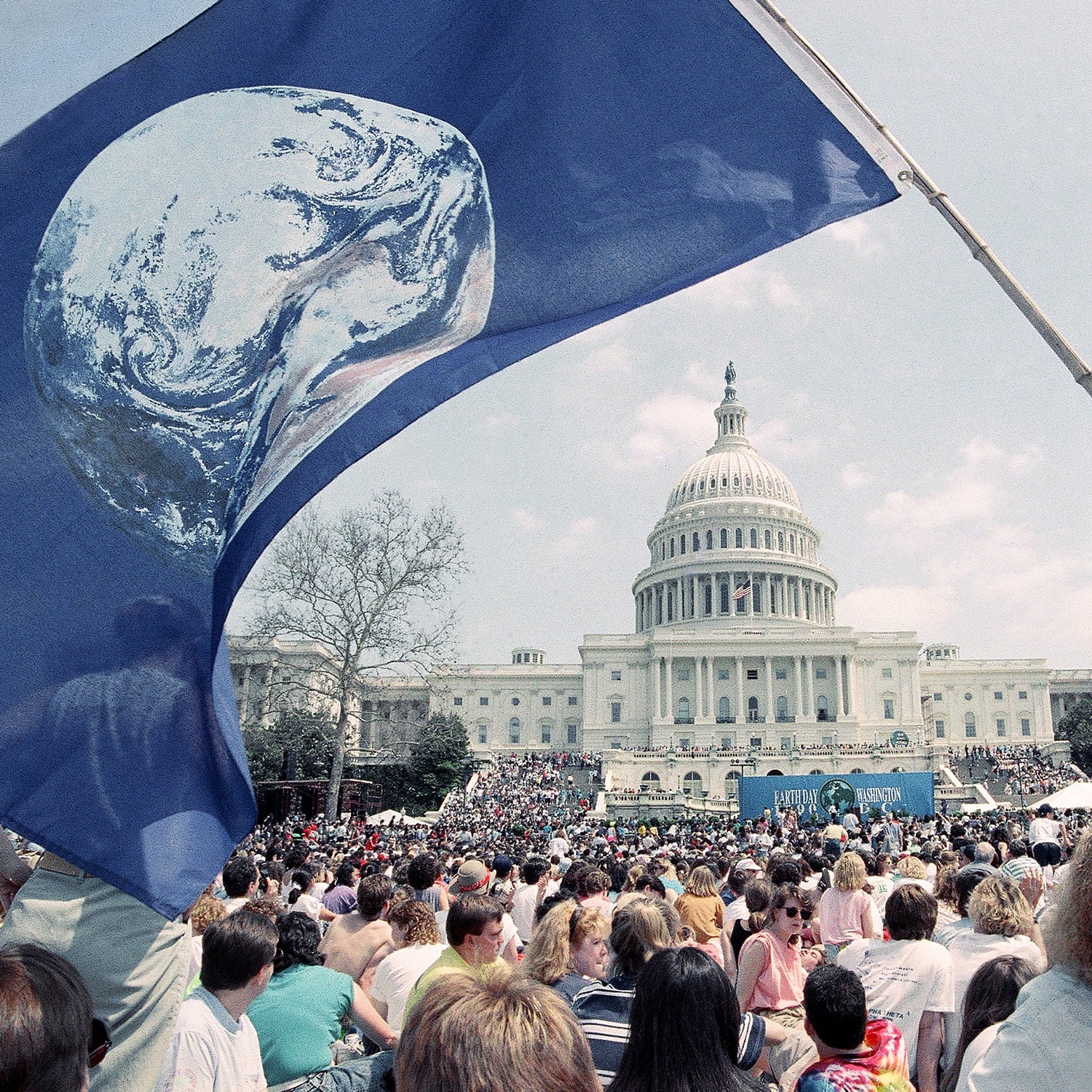This Earth Day was supposed to be different.
Over the years, April 22╠²has become known for toothless, symbolic activities: plant a tree, buy another reusable drinking vessel. It can be difficult to remember that, 50 years ago, after the Cuyahoga River in Ohio caught fire and the countryŌĆÖs biggest oil spill covered the coast of Santa Barbara, California, both Republicans and Democrats were galvanized into real political action.
On the first Earth Day, in 1970, ŌĆö10 percent of the American population at the timeŌĆöflooded the streets demanding change. Two-thirds of our congressmen╠²spoke at Earth Day events. President Richard Nixon had just signed the National Environmental Policy Act, requiring╠²that new development projects study potential environmental impacts. ŌĆ£Political momentum was inevitable,ŌĆØ says advocate Denis Hayes, who helped organize the first Earth Day. Throughout the seventies, environmental legislation continued to roll through Congress: the , the , the Endangered Species Act, the founding of the Environmental Protection Agency, and the Superfund program.
Earth Day lost its political power over time, but before COVID-19 changed everythingŌĆöespecially social gatheringsŌĆöactivists hoped to use the╠²50th anniversary to change that. Organizers geared up for a global protest to match the scale of the first Earth Day: people flooding the streets, demanding regulation, protection, and meaningful carbon-reduction goals.
ŌĆ£The aspiration was an international gathering of big, big crowds,ŌĆØ Hayes says. ŌĆ£Pope Francis committed to St. PeterŌĆÖs Square. We had soccer stadiums booked in South America╠²and 750,000 people on the mall in D.C. [We wanted] a billion people saying, ŌĆśItŌĆÖs time for bold action, we canŌĆÖt just fiddle.ŌĆÖŌĆØ
Meaningful Actions for Earth Day
Luckily, if╠²you care about being outside, you can still participate in a meaningful Earth Day from inside.╠²We may not be able to physically come together to demonstrate╠²right now, but environmental momentum is still critically important.╠²We can take action by╠²building coalitions, lobbying elected officials, and voting.
To kick off the momentum, the Earth Day Network, which was organizing those billion-people protests, is hosting a 24-hour virtual event, Earth Day Live, in conjunction with other climate groups. The first Earth Day was a catalyst for long-term change because it reinforced solidarity and galvanized the public. In our modern, digital era, we can try to recreate that experience in a virtual setting.
That success was built over years or decades, not in a single day, and it required legislative action. The same is true now. On May 4, Congress is slated to go back into session, where it will╠²consider policies including more stimulus funding and the EPAŌĆÖs air-quality standards. Now is a good time to look up your representatives, check which╠²policies they support, and contact them to ask that they support environmental regulations when the next legislative session begins.
╠²believe the government isnŌĆÖt doing enough to address climate change, but there havenŌĆÖt been sweeping legislative wins for environmentalism in decades. If we want that to change, we have to put more pressure on politicians who are stalling action. Hayes notes that one of the biggest wins from the first Earth Day was that the public voted 20 pollution-friendly congressmen out of office in the next election cycle. In the lead-up to our╠²November election, Hayes says that environmental activistsŌĆÖ first order of business should be widespread voter registration. That way╠²we can target politicians with who are up for reelectionŌĆöincluding the president.
A Climate Change Denier in the White House
As the Trump White House denies climate change and loosens regulations on everything from carbon emissions to mercury pollution, the EPAŌĆÖs website encourages╠²people to celebrate Earth Day by ŌĆ£sharing window art.ŌĆØ (With all due respect, hell no.) The╠² says we have to drastically reduce greenhouse-gas emissions by the end of this decade, but current regulationsŌĆömostly controlled by agencies within TrumpŌĆÖs executive branchŌĆöachieve the opposite effect. Just last week, TrumpŌĆÖs EPA relaxed╠²standards on air pollutants like toxic mercury for the coal industry. Climate change is on the rise, and its effects are immediate: in some parts of the United States, people could face╠²massive floods on a daily basis, while other parts of the country are coming into fire season, and emergency supplies and funding are spread thin due to the pandemic.
The first Earth Day happened on the back of the civil rights and anti-war movements, when protesting and political organizing was a powerful force╠²and marchers came out in force to disrupt the political status quo. Organizing crowds of people to march now is currently impossible, but itŌĆÖs still crucial to channel that civic power.
As Hayes points out, even in 1970, the environment wasnŌĆÖt the only thing making╠²news. ŌĆ£A week after the first Earth Day, Nixon started bombing Cambodia, and the next week, the National Guard shot people at Kent State,ŌĆØ he says. ŌĆ£We had been front page, top of the fold, we got knocked off, but then it came back around.ŌĆØ Environmental activists had to stay mobilized╠²and maintain pressure on elected officials. They did, and their grassroots movement eventually gained traction in Congress.
Back then╠²the biggest known threat to the planet was rampant chemical pollution. After the Clean Air Act was passed, aggregate air pollution dropped 70 percent. The current administration is trying to roll back those hard-won╠²gains╠²to benefit╠²industries instead of public health; for example, it recently changed a coal-plant-emission rule to have substantially fewer protections. Now, in addition to trying to uphold those important, long-standing regulations, weŌĆÖre facing climate change, which wasnŌĆÖt written about until the late 1980s and did not enter broader public discourse until later still.
Today we know more about what the planet is facingŌĆöwe╠²are well╠²aware that the stakes are incredibly high and, metaphorically speaking, the river is still on fire. We need to work locally and nationally to cut carbon and increase environmental regulations. We need to elect people who support the Paris climate accord╠²and other international climate cooperation.
Just like it was five decades ago, Earth Day can be a starting point for that.


